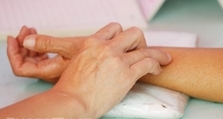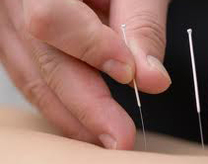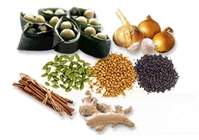We provide Traditional Chinese Medicine Diagnosis, Acupuncture, Moxibustion, Tuina, Cupping, Chinese herbs, Shi Liao (Dietary therapy), Qigong or Taiji class in our clinic.
Traditional Chinese Medicine Diagnosis

Diagnose the diseases with the eight principles, the theory of Wei, Qi, Ying, Xue. It sets the principle to guard the treatment.
Acupuncture

Acupuncture is a natural healing technique which regulates the flow of vital energy (Qi) through the needles' stimulation. De-qi (obtaining of qi ) refers to a sensation of numbness, distension, or electrical tingling at the needling site which might radiate along the corresponding meridian. If it can not be generated,which could cause by inaccurate location of the acu-point, improper depth of needle insertion, inadequate manipulation, or a very weak constitution of the patient have to be considered, then it will decrease the likelihood of successful treatment. Acupuncture has been proven to be safe and effective treatment for a wide range of conditions including headache, migraine, arthritis, joints pain, nausea, infertility, and emotional disorders.
Moxibustion, Tuina, Cupping warms the meridians and energizes the flow of Qi and blood to balance the Yin and Yang.
How does acupuncture work? Throughout the long history of TCM, much research has been conducted. As the positive results of acupuncture become more universally recognized, modern scientific research verified that acupuncture modulates the imbalanced autonomic nervous system (vagus and sympathetic nervous system) activity through inducing neurotransmitters such as GABA, glutamine, substance P, endorphin et al.
Do acupuncture needles hurt? Are there any after-effects from acupuncture?
In the hands of a skilled practitioner, the extremely fine (about the size of a think hair) disposable needles, are rarely felt entering the skin. Sensations such as sour, distension, warmth, pressure, or numbness may be experienced as the needle reaches the correct depth. No harmful after-effects from acupuncture are associated. Initially, when you begin your treatment, you may feel tired or sleepy, notice more frequent bowel movements and increased urination, or experience a worsening of symptoms and/or pain. Any of these reactions should not be a cause for concern, rather, they usually indicate that your body is responding to the treatment and trying to achieve a proper and healthy balance.
How many treatments will I need? How long will the effects last?
Because each person is unique, the number and frequency of treatments will vary. Also the nature of your illness, the length of time you’ve had the condition, your general state of health and vitality, and your overall response will also contribute to your individual treatment plan. In general, often when people respond well to acupuncture they retain their improvement for months or maybe even years after the initial treatment. For those people whose symptoms reappear, only a few additional treatments will be necessary to regain the experience of improved health. Also, acupuncturist do not advised discontinuing treatment as soon as you start feeling better since doing so, may result in possible relapse of symptoms, and regress your long term improvement. Ask your acupuncturist about a maintenance plan that will meet your individual needs.
What types of conditions might benefit from acupuncture?
Moxibustion, Tuina, Cupping warms the meridians and energizes the flow of Qi and blood to balance the Yin and Yang.
How does acupuncture work? Throughout the long history of TCM, much research has been conducted. As the positive results of acupuncture become more universally recognized, modern scientific research verified that acupuncture modulates the imbalanced autonomic nervous system (vagus and sympathetic nervous system) activity through inducing neurotransmitters such as GABA, glutamine, substance P, endorphin et al.
Do acupuncture needles hurt? Are there any after-effects from acupuncture?
In the hands of a skilled practitioner, the extremely fine (about the size of a think hair) disposable needles, are rarely felt entering the skin. Sensations such as sour, distension, warmth, pressure, or numbness may be experienced as the needle reaches the correct depth. No harmful after-effects from acupuncture are associated. Initially, when you begin your treatment, you may feel tired or sleepy, notice more frequent bowel movements and increased urination, or experience a worsening of symptoms and/or pain. Any of these reactions should not be a cause for concern, rather, they usually indicate that your body is responding to the treatment and trying to achieve a proper and healthy balance.
How many treatments will I need? How long will the effects last?
Because each person is unique, the number and frequency of treatments will vary. Also the nature of your illness, the length of time you’ve had the condition, your general state of health and vitality, and your overall response will also contribute to your individual treatment plan. In general, often when people respond well to acupuncture they retain their improvement for months or maybe even years after the initial treatment. For those people whose symptoms reappear, only a few additional treatments will be necessary to regain the experience of improved health. Also, acupuncturist do not advised discontinuing treatment as soon as you start feeling better since doing so, may result in possible relapse of symptoms, and regress your long term improvement. Ask your acupuncturist about a maintenance plan that will meet your individual needs.
What types of conditions might benefit from acupuncture?
- Pain syndromes: back, neck, shoulder, knee, sciatica, arthritis
- Gastro-Intestinal Disorders: constipation, diarrhea, gastritis, ulcers
- Neurological Disorders: paralysis, numbness, Carpal Tunnel Syndrome
- Stress-Related Syndromes: migraines, anxiety, depression, insomnia
- Gynecological Disorders: infertility, menstruation, menopause
- Heart Problems: high blood pressure, palpitations, high cholesterol
- Sexual Dysfunction: impotence, premature ejaculation
- Addictions: drugs, alcohol, tobacco
- Soft-Tissue Injuries, Allergies and Immune System Deficiencies
- Temporomandibular Joint Syndrome (TMJ)
Chinese herbs, Shi Liao (Dietary therapy)

Chinese herbs: Based on herbs' cold or warm properties, lowering, lifting, floating, sinking actions and acid, sweet, bitter, and salty flavors which was experienced and repeated verified by TCM doctors, we construct different herbal formulas to treat different disorders. Because stomach is recognized as our second brain, some herbs work as the input messages at our nerves reflex arc to re-balance the functional disorders at the first place.
There are three ways to beneficially combine herbs.
1, Mutual Reinforcement involves combining two very similar herbs to create a strong effect; 1 + 1 > 2. For example, astragalus and ginseng are both effective for increasing energy. Combining these herbs will create a very strong effect on energy increase.
2, Mutual Assistance is the method of using one herb to help another work better. Astragalus also strengthens the immune system as well as increasing energy. Hoelen is similar. Adding hoelen to astragalus increases its effectiveness better than simply doubling the amount of astragalus.
3, Mutual Restraint relies upon one herb reducing or eliminating side effects of another herb in the combination. Fresh ginger, for example, reduces the side effects of arisaema.
Experience and knowledge are very important for TCM practitioners to prescribe herbs mixture which could fit the patient's symptoms and diagnoses. Because mutual inhibition occurs when one herb reduces another's effectiveness; and incompatibility occurs when the combination of certain herbs produces side effects or becomes poisonous.
For what reasons should herbs be taken?
Generally speaking, herbs can be taken for all kind of diseases. Because it is natural therapy, most herbs do not cause side effects. Those side effects that do occur can be easily counteracted with other herbs. Herbal medicine is simply gentler and safer than chemical medicine. For these reasons, people turn to herbal therapy for a number of indications.
1, To treat a chronic disease — many people with chronic diseases take a number of different drugs. Those who are looking for a natural replacement for those drugs switch to herbal therapy. There are herbal replacements for the medications taken for pain syndromes, gastrointestinal disorders, neurological disorders, stress related syndromes, respiratory disorders, heart problems, sexual dysfunction, allergies and immune system deficiencies, as well as replacements for antibiotics and anti-inflammatory drugs.
2, To reduce medication side effects -- Herbs can be taken to reduce the side effects of other medication. Antibiotics weaken the immune system. Herbal therapy can strengthen the system. Also, during chemotherapy, the white blood cell count drops, causing fatigue, lack of energy and appetite. Herbal therapy has proven quite successful in relieving the side effects of chemotherapy.
3, To assist conventional medication — Herbal medicine can strengthen the effects of conventional medication. For example, if a patient is taking medication for his high blood pressure, but it is not producing the desired effects, his doctor may increase the dosage. A heavy dosage can produce unwanted side effects. The patient can, instead, take an herbal supplement that will produce the desired decrease in blood pressure without the side effects.
4, For prevention -- Herbs are often taken as a method of prevention. For a person suffering from frequent headaches, taking herbs to prevent the headache from ever starting is a much better option than taking a pain reliever after the fact. Herbs are also used to prevent the flu, menstrual cramps and pre-menstrual syndrome, among other things.
5, For health maintenance -- Herbal therapy can also be used for general health maintenance. Tonic herbs are used to increase energy and to slow the aging process. They are also used for enhancing sexual energy and for cosmetic purposes. Herbs are also used to treat minor symptoms that are not severe enough for heavy chemical drugs, symptoms that cannot be diagnosed by conventional medicine, and symptoms and illness that are not easy to treat, such as mononucleosis and immune system deficiencies.
What are some precautions of taking herbs?
Herbs, like anything you put in your body, should be taken with a certain amount of caution. For example, some herbs can be too strong for pregnant women and may cause miscarriage. Also, while taking herbs we want to avoid certain foods such as raw (fruit is okay, but vegetables should be cooked), greasy, strong tasting or smelling foods and foods that can be difficult to digest (such as beef) or irritating to the digestive system (like spicy foods), since they can have an adverse effect on the herbal therapy.
How are herbs taken?
Herbal medicine is traditionally taken in tea form. Tea absorbs into the system quickly, and is the most commonly used method. However, if the smell or taste of the tea is unpleasant, capsules or tablets are recommended. Tea should always be warm, and capsules or tablets should be swallowed with warm water. Generally, it is best to take herbs on an empty stomach. You should consult an herbalist for specific instructions on taking herbs, but here are some basic guidelines. Tonic herbs, to promote health, are best taken before meals. Purgative herbs, to cleanse the system, are best taken on an empty stomach. Herbs that either irritate the stomach or are taken to protect the stomach should be taken after eating. Herbs for insomnia and other sleeping disorders should be taken at bedtime.
Shi Liao (Dietary therapy): Combined selective herbs with specific foods in our diet. It will modify our internal milieu and help us to balance our neuroimmunoendocrine disorders.
There are three ways to beneficially combine herbs.
1, Mutual Reinforcement involves combining two very similar herbs to create a strong effect; 1 + 1 > 2. For example, astragalus and ginseng are both effective for increasing energy. Combining these herbs will create a very strong effect on energy increase.
2, Mutual Assistance is the method of using one herb to help another work better. Astragalus also strengthens the immune system as well as increasing energy. Hoelen is similar. Adding hoelen to astragalus increases its effectiveness better than simply doubling the amount of astragalus.
3, Mutual Restraint relies upon one herb reducing or eliminating side effects of another herb in the combination. Fresh ginger, for example, reduces the side effects of arisaema.
Experience and knowledge are very important for TCM practitioners to prescribe herbs mixture which could fit the patient's symptoms and diagnoses. Because mutual inhibition occurs when one herb reduces another's effectiveness; and incompatibility occurs when the combination of certain herbs produces side effects or becomes poisonous.
For what reasons should herbs be taken?
Generally speaking, herbs can be taken for all kind of diseases. Because it is natural therapy, most herbs do not cause side effects. Those side effects that do occur can be easily counteracted with other herbs. Herbal medicine is simply gentler and safer than chemical medicine. For these reasons, people turn to herbal therapy for a number of indications.
1, To treat a chronic disease — many people with chronic diseases take a number of different drugs. Those who are looking for a natural replacement for those drugs switch to herbal therapy. There are herbal replacements for the medications taken for pain syndromes, gastrointestinal disorders, neurological disorders, stress related syndromes, respiratory disorders, heart problems, sexual dysfunction, allergies and immune system deficiencies, as well as replacements for antibiotics and anti-inflammatory drugs.
2, To reduce medication side effects -- Herbs can be taken to reduce the side effects of other medication. Antibiotics weaken the immune system. Herbal therapy can strengthen the system. Also, during chemotherapy, the white blood cell count drops, causing fatigue, lack of energy and appetite. Herbal therapy has proven quite successful in relieving the side effects of chemotherapy.
3, To assist conventional medication — Herbal medicine can strengthen the effects of conventional medication. For example, if a patient is taking medication for his high blood pressure, but it is not producing the desired effects, his doctor may increase the dosage. A heavy dosage can produce unwanted side effects. The patient can, instead, take an herbal supplement that will produce the desired decrease in blood pressure without the side effects.
4, For prevention -- Herbs are often taken as a method of prevention. For a person suffering from frequent headaches, taking herbs to prevent the headache from ever starting is a much better option than taking a pain reliever after the fact. Herbs are also used to prevent the flu, menstrual cramps and pre-menstrual syndrome, among other things.
5, For health maintenance -- Herbal therapy can also be used for general health maintenance. Tonic herbs are used to increase energy and to slow the aging process. They are also used for enhancing sexual energy and for cosmetic purposes. Herbs are also used to treat minor symptoms that are not severe enough for heavy chemical drugs, symptoms that cannot be diagnosed by conventional medicine, and symptoms and illness that are not easy to treat, such as mononucleosis and immune system deficiencies.
What are some precautions of taking herbs?
Herbs, like anything you put in your body, should be taken with a certain amount of caution. For example, some herbs can be too strong for pregnant women and may cause miscarriage. Also, while taking herbs we want to avoid certain foods such as raw (fruit is okay, but vegetables should be cooked), greasy, strong tasting or smelling foods and foods that can be difficult to digest (such as beef) or irritating to the digestive system (like spicy foods), since they can have an adverse effect on the herbal therapy.
How are herbs taken?
Herbal medicine is traditionally taken in tea form. Tea absorbs into the system quickly, and is the most commonly used method. However, if the smell or taste of the tea is unpleasant, capsules or tablets are recommended. Tea should always be warm, and capsules or tablets should be swallowed with warm water. Generally, it is best to take herbs on an empty stomach. You should consult an herbalist for specific instructions on taking herbs, but here are some basic guidelines. Tonic herbs, to promote health, are best taken before meals. Purgative herbs, to cleanse the system, are best taken on an empty stomach. Herbs that either irritate the stomach or are taken to protect the stomach should be taken after eating. Herbs for insomnia and other sleeping disorders should be taken at bedtime.
Shi Liao (Dietary therapy): Combined selective herbs with specific foods in our diet. It will modify our internal milieu and help us to balance our neuroimmunoendocrine disorders.
